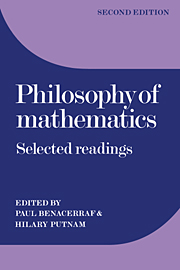Book contents
- Frontmatter
- Contents
- Preface to the second edition
- Introduction
- Part I The foundations of mathematics
- Part II The existence of mathematical objects
- Part III Mathematical truth
- Part IV The concept of set
- Russell's mathematical logic
- What is Cantor's continuum problem?
- The iterative concept of set
- What is the iterative conception of set?
- The concept of set
- Bibliography
Russell's mathematical logic
Published online by Cambridge University Press: 05 June 2012
- Frontmatter
- Contents
- Preface to the second edition
- Introduction
- Part I The foundations of mathematics
- Part II The existence of mathematical objects
- Part III Mathematical truth
- Part IV The concept of set
- Russell's mathematical logic
- What is Cantor's continuum problem?
- The iterative concept of set
- What is the iterative conception of set?
- The concept of set
- Bibliography
Summary
Mathematical logic, which is nothing else but a precise and complete formulation of formal logic, has two quite different aspects. On the one hand, it is a section of Mathematics treating of classes, relations, combinations of symbols, etc., instead of numbers, functions, geometric figures, etc. On the other hand, it is a science prior to all others, which contains the ideas and principles underlying all sciences. It was in this second sense that Mathematical Logic was first conceived by Leibniz in his Characteristica universalis, of which it would have formed a central part. But it was almost two centuries after his death before his idea of a logical calculus really sufficient for the kind of reasoning occurring in the exact sciences was put into effect (in some form at least, if not the one Leibniz had in mind) by Frege and Peano. Frege was chiefly interested in the analysis of thought and used his calculus in the first place for deriving arithmetic from pure logic. Peano, on the other hand, was more interested in its applications within mathematics and created an elegant and flexible symbolism, which permits expressing even the most complicated mathematical theorems in a perfectly precise and often very concise manner by single formulas.
It was in this line of thought of Frege and Peano that Russell's work set in. Frege, in consequence of his painstaking analysis of the proofs, had not gotten beyond the most elementary properties of the series of integers, while Peano had accomplished a big collection of mathematical theorems expressed in the new symbolism, but without proofs.
- Type
- Chapter
- Information
- Philosophy of MathematicsSelected Readings, pp. 447 - 469Publisher: Cambridge University PressPrint publication year: 1984
- 18
- Cited by

